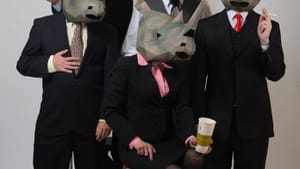Stay in the Loop
BSR publishes on a weekly schedule, with an email newsletter every Wednesday and Thursday morning. There’s no paywall, and subscribing is always free.
Absurd is the new normal
Fringe Festival: Idiopathic Ridiculopathy’s ‘Rhinoceros’

“They should all be rounded up into giant pens and kept under strict supervision,” Bérenger exclaims in Eugène Ionesco’s Rhinoceros, in the Idiopathic Ridiculopathy Consortium’s Fringe Festival production running at the Adrienne, with a translation by Derek Prouse.
Bérenger, a man who “can’t get used to life” on a normal day, watches his pleasant little French town become inexplicably overrun by rhinoceroses — and on Sunday at market time, too. Have the rhinoceroses no consideration at all?
His line about the need for some serious fencing reminded me suddenly of a controversy from about two years ago, when a Baptist pastor in North Carolina gave a rather inflammatory sermon that someone shared on YouTube. In short, the august man of God insisted that America’s gay and lesbian people ought to be rounded into giant pens and left to their own natural extinction.
This kind of talk unfortunately affirms director Tina Brock’s note in the playbill, in which she explains that “absurdist works” were “once considered strange, difficult to understand, [and] bizarre,” but that in today’s weird and wild world, this is changing: A lot of us are surrendering to the notion of life without inherent meaning or order.
“Each week presents a new and frightening development. Absurd has become the new normal,” Brock writes of why Ionesco’s work is still going strong.
Of course, Ionesco’s allegory of a town gone mad with a violent strain of rhinoceritis is rooted in his 20th-century critique of the metastasization of Nazism, but in Brock’s words, this “metaphysical farce” stands in any age.
A hard-working and sympathetic Ethan Lipkin leads the IRC cast as Bérenger, cowed by his trim, florid, relentlessly know-it-all pal Jean (David Stanger). The latter sure can dish it out, but he can’t take it when he wakes up one morning with his own horn sprouting. Another standout in the ensemble cast is Jerry Rudasill as a waitress and then the put-upon Mr. Papillon, trying to manage a law publication firm as the epidemic takes over the streets.
Fast and furious
The performance has a loud, fast, hysterical tone from the opening dialogue (in her curtain speech, Brock said there would probably be too much commotion onstage to bother with turning off our phones), but Rudasill adds respite and nuance when he builds to Papillon’s outbursts, fingers gouging his forehead in consternation.
Brock designed the sound, too, and the show’s frenzied noise kicks on at the same level as the dialogue from the beginning: A thundering stampede heralds the single rhinoceros first spotted by the townspeople and continues as the herd supposedly increases exponentially.
In the play’s latter half, when the excellent rhinoceros heads themselves begin to weave throughout Erica Hoelscher’s set, Brock underscores Bérenger’s increasing isolation by giving us a peaceful sense of the beasts, as if Bérenger, in his masked and bandaged terror, is indeed mistaken in his determination to “put up a fight against the whole lot of them.”
Far from the pandemonium suggested by the stampeding sounds, when the rhinos become the majority and appear onstage, they’re curiously stylized and languid. When Bérenger’s own love, Daisy (Kirsten Quinn) begins to show the trademark symptoms (“I want to eat outside, on the grass!”), we don’t hear the stampede anymore, but the alluring strains of Philip Glass’s “In the Upper Room,” while the rhinos themselves swoop into a graceful ballroom dance.
IRC’s show is a fine production, full of perfectly timed verbal volleys and colorful character detail in every costume, from the glasses to the spats to the bow-ties. Hoelscher’s ingenious set has translucent paper doors that withstand much running and slamming until the rhinos’ horns stab through.
No comments?
But leaving the show, I realized that Rhinoceros, however well-staged, puts me in the same mood as dipping into the online comment thread on any article that’s gone the least bit viral.
Rhinos are suddenly stampeding through a little French town, and all the play’s characters can do is argue furiously about how many rhinoceroses there are, how many horns each of them had, the construction of the office stairs, and their worries about the dust.
It reminds me of every time I read an online article about economics, feminism, gluten-free living, or anything else, and a hardy contingent of commenters invariably devote themselves to arguing about whether the current president is a harbinger of the demise of our civilization.
Ever since a college professor made Rhinoceros assigned reading, I’ve had a sneaking suspicion that those inevitable, unthinking arguments are the whole point. So if I avoid the play henceforth for the same reason I avoid opening the comment section, Ionesco might understand.
For a review by Carol Rocamora, click here.
For a review by Robert Zaller, click here.
What, When, Where
Rhinoceros. An Idiopathic Ridiculopathy Consortium production for the Fringe Festival. Tina Brock directed. Through September 21 at the Skybox at the Adrienne, 2030 Sansom Street, Philadelphia. http://idiopathicridiculopathyconsortium.org/ or http://fringearts.com/event/eugene-ionescos-rhinoceros-18/.
Sign up for our newsletter
All of the week's new articles, all in one place. Sign up for the free weekly BSR newsletters, and don't miss a conversation.

 Alaina Johns
Alaina Johns